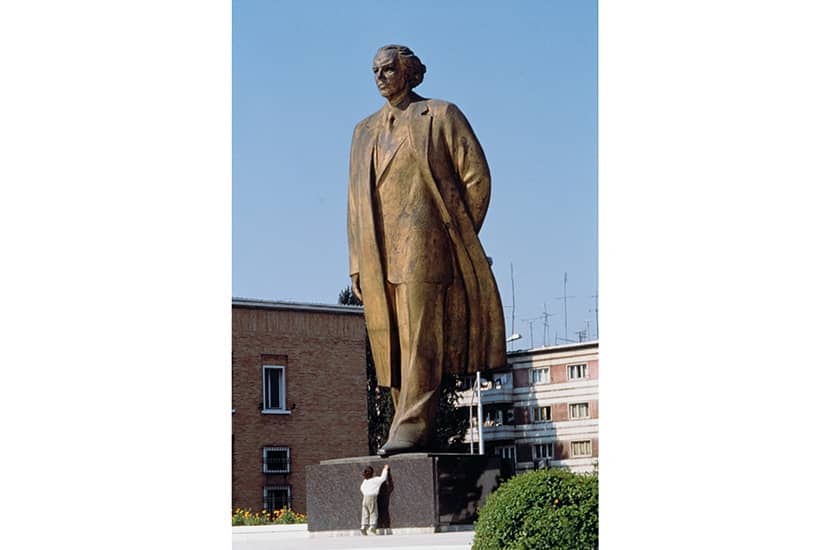For many in the West, Albania remains as remote and shadowy as the fictional Syldavia of the Tintin comics. The country came into existence only in 1912, with the decline of the Ottoman Empire. Its first ruler, King Zog, was ousted by Mussolini when he invaded in 1939. Hitler used Albania as a springboard for the Nazi invasion of Greece. The national resistance against Italy and Germany was led by the Albanian partisan supremo Enver Hoxha (pronounced ‘Hodger’). After expelling the hated occupiers, in 1946 the artful Hoxha proclaimed himself head of a newborn socialist republic. With his dangerous wife Nexhmije (the ‘Lady Macbeth of the Balkans’) he turned Albania into a self-immolated model of Stalinist planning, where Party purges, summary arrests and show trials were routine.
Muslim-born, Hoxha was at heart an Ottoman dandy in the megalomaniac lineage of Tamburlaine. He uncannily resembled Arthur Daley of Minder fame and was known for his love of the Norman Wisdom films, which cock a snook at factory owners and other agents of capitalist power. However, there was little to laugh about in the red paradise of Albania. During his 41-year regime Hoxha executed some 6,000 opponents, jailed around 34,000 (1,000 of whom died) and sent 59,000 into internal exile. He made a show of outlawing local Ottoman-era customs such as gjakmarrje (blood revenge killings), which he considered part of backward Balkan tribalism. Yet the politburo he created under Nexhmije’s guidance was in many ways a microcosm of the ancient, tribal Albania with its retributive justice and purification of honour through vengeance. Party members were united less by the rigours of dialectical materialism than by ties of family, blood and clan.
Not one of the feared Sigurimi was ever put on trial for torture or other cruelties
Lea Ypi was a child at nursery school when, on 11 April 1985, news came that Hoxha had died. Like all Albanians, she was caught up in the cycle of collective mourning, as grown men and women publicly howled and tore their hair in grief. Incapacitated with diabetes, in his final months Hoxha had looked bloated, his face coated in deceiving powder blush. Ypi stared in disbelief at images on her parents’ television of the funeral procession in the capital, Tirana. Nexhmije remained in power behind the replacement president, Ramiz Alia, for a further five years until 1990, when the Berlin Wall came down and Albania was convulsed by anti-communist riots. Until that time, Ypi continued to swear allegiance to Uncle Enver.
Free: Coming of Age at the End of History is a memoir of her Albanian childhood. Ypi wrote most of it during the Covid-19 pandemic, but it shows little sign of hurried composition. With a winning humour she describes a country consigned to half a century of Marxist-Leninist ideological hibernation. Western luxuries were so coveted that even empty Coca-Cola cans were cherished as domestic adornments. (Those lucky enough to own one would display it on top of the television set next to a photo of Hoxha.) While ordinary Albanians starved in what was then the poorest country in Europe, party members enjoyed Italian salamis, French wines, American cigarettes — and Norman Wisdom. Ypi’s own socially downgraded, middle-class parents scrimped to put milk on the table.
Small wonder the towering bronze statue of Hoxha was toppled during the riots in Tirana in February 1990. As a rebellious teenager in the capitalist democracy that followed, Ypi listened to Metallica heavy metal while drug dealers shot at sex- traffickers on the streets with Kalashnikovs. Overnight, the old socialist collectives gave way to dubious market economies. As Ypi comments laconically: ‘Things were one way, and then they were another.’ Desperate to escape, Albanians clambered aboard ships bound for Italy or scaled the walls of Tirana’s foreign embassies. Ypi found herself questioning the meaning of freedom. (She is now a professor of political theory at the LSE.) With its delicious sour-sweet comedy and pages of precise observation, Free opens a window on to one of the most bleakly isolationist regimes in human history.
Not one of Hoxha’s secret police — the feared Sigurimi — was ever put on trial for torture or other cruelties. Nexhmije Hoxha, Europe’s last unrepentant Stalinist, was nevertheless sentenced to 11 years in jail for embezzlement and abuse of state power. (When I met her in Tirana in December 1991 she was under house arrest in Party Villa No. 6 but still smartly dressed in patent leather shoes and a twinset.) Her ghost hovers over Mud Sweeter than Honey, a collection of interviews with Albanian writers, artists, chauffeurs, fishermen, stonemasons and others who survived the Sigurimi and its depredations. None of them has a good word to say for Nexhmije, who helped to run the Sigurimi in the 1960s when she was propaganda minister. (‘There was never a shortage of pain; there was always more of it to inflict,’ one of them says typically.) Margo Rejmer, the Polish writer who assembled this extraordinary book, offers a ‘polyphonic’ account of the victims of Albanian communism in the style of Svetlana Alexievich’s Chernobyl Prayer. The book is certainly depressing but, as the journalist Tony Barber notes in his introduction, it serves as an ‘essential reminder’ of dark days in the Balkans.






Comments